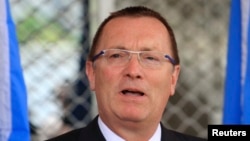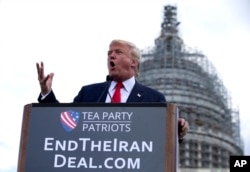A U.N. report says Iran has not received any unauthorized transfers of nuclear-related items since an international nuclear agreement was implemented a year ago, but Tehran may have violated some provisions on conventional arms transfers and travel restrictions.
"The secretary-general has not received any report, nor is aware of any open source information, regarding the supply, sale or transfer to Iran of nuclear-related items undertaken contrary to the provisions of the resolution," U.N. political chief Jeffrey Feltman told the Security Council on Wednesday.
Resolution 2231 was adopted in July 2015, endorsing the Joint Comprehensive Plan of Action that aims to ensure Iran does not acquire nuclear weapons. The five permanent members of the Security Council plus Germany negotiated the deal with Iran.
IAEA reported compliance
Feltman's briefing covered only Annex B of the resolution, including nuclear- and ballistic-missile-related transfers to or from Iran, as well as asset freezes and travel bans. He did not cover Annex A provisions — namely, implementation of Iran's nuclear-related commitments and sanctions. But in four prior reports, the U.N.'s nuclear watchdog agency, the International Atomic Energy Agency, has verified that Tehran is abiding by its nuclear-related commitments.
Feltman said the U.N. also had not received any information of Iranian violations of the provisions regulating ballistic-missile activities or related transfers. But he did express concern about "possible ongoing travel ban violations," including by two senior Iranian army generals.
The U.N. report expressed concern that Iran also might have attempted to send conventional weapons to Somalia or Yemen in the past year, and according to televised remarks by the leader of the Lebanese Shi'ite group Hezbollah, Tehran supplies all of its weapons and missiles. If verified, these would be violations of Resolution 2231.
All of this information has been reported before, but the U.N. secretariat is required to brief the Security Council twice a year on implementation. Overall, Feltman concluded that his briefing to the council was taking place "against a backdrop of steady implementation, cooperation and progress."
Continued U.S. commitment?
In a possible reference to comments by U.S. President-elect Donald Trump that he thought the Iran deal was "terrible" and should be torn up, Feltman reiterated the necessity of international support for the agreement's full implementation.
Several council members echoed that sentiment, calling the deal "historic" and one of the major diplomatic achievements of the last decade that requires a long-term commitment from all parties.
In Washington on Wednesday, Trump's nominee to become U.N. ambassador, South Carolina Governor Nikki Haley, took a less aggressive tone at her Senate confirmation hearing. When asked whether she supported the U.S. backing out of the nuclear deal, she said, "I think what would be more beneficial at this point is that we look at all the details of the Iran deal; we see if they are actually in compliance."
Haley said if Iran violated the agreement, then the U.S. should "act on those violations."
Diplomatic dividends
Some council members noted that since the deal's implementation, they had experienced a surge in trade with Iran.
The European Union said its trade with Tehran was up by 63 percent over the first three quarters of last year. Britain noted a 42 percent increase in its exports to the country, and France said bilateral trade was up 200 percent in overall value since the deal was implemented last January.
But while they touted the mutual economic benefits, they noted that progress had been tempered by Iran's negative behavior in the Middle East — specifically, its support of the Bashar al-Assad regime in Syria and its threats against Israel.





